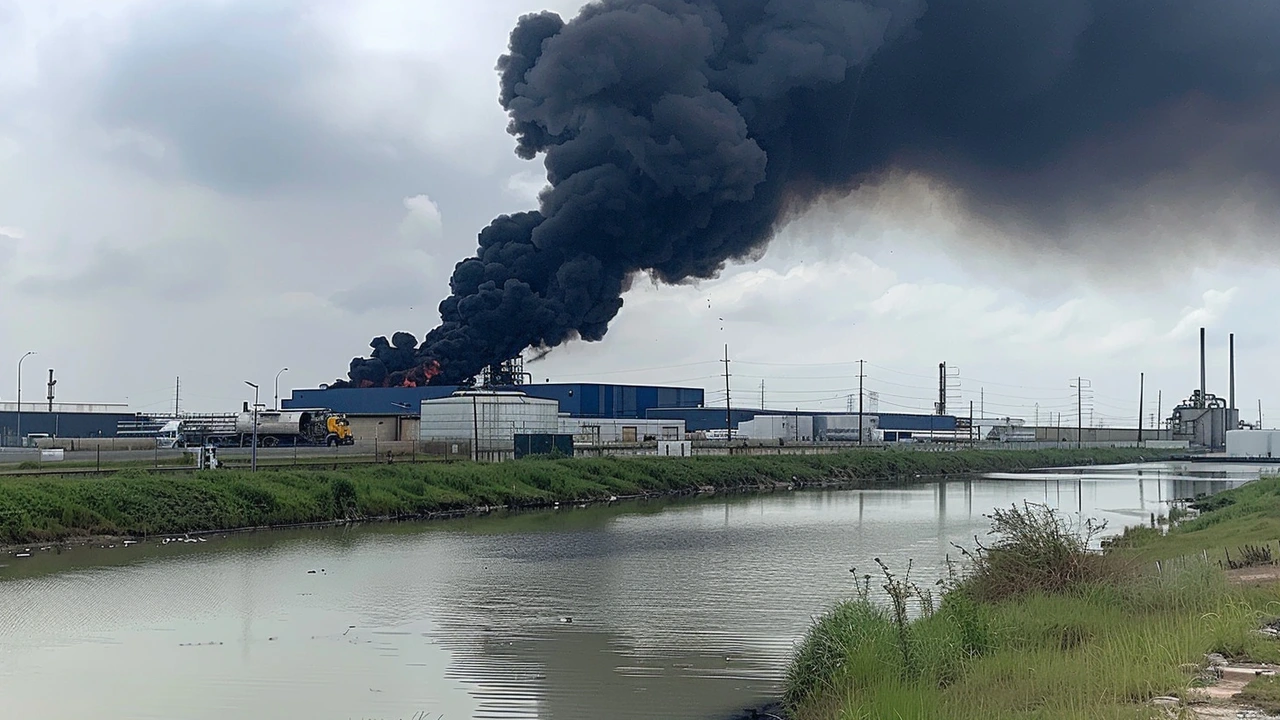
Fire Incident at Dangote Refinery's Effluent Treatment Plant Quickly Contained
On the 26th of June, a fire broke out at the effluent treatment plant of Dangote's petroleum refinery. This incident, though alarming at first, was swiftly managed and contained by the refinery's emergency response team. Anthony Chiejina, the Chief Corporate Communication Officer of the group, confirmed in a public statement that the fire was brought under control efficiently and reassured the public that there is no cause for alarm. He emphasized that the situation was handled professionally, ensuring that the refinery's operations were not disrupted and that there were no injuries reported among the staff members on duty.
Swift Response to the Fire
The swiftness in containing the fire can be attributed to the well-prepared emergency protocols and the quick action from the refinery's response team. Staff members are regularly trained to handle such emergencies, which played a crucial role in the prompt control of the situation. The refinery's management has always prioritized safety and has equipped the plant with modern firefighting tools and systems, ensuring that any potential hazards can be immediately addressed.
Impact on Operations
Despite the scare, Dangote Refinery continues to operate normally. The fire incident did not lead to any significant damage to the plant's facilities or disrupt production. This is crucial to note as the refinery plays a significant role in the region's petroleum supply chain. The refinery's management has reassured all stakeholders that there are no long-term effects anticipated from this incident. Operations are ongoing, and there is no expected impact on the supply of refined petroleum products.
Commitment to Safety
Dangote Group has always highlighted its commitment to ensuring the highest safety standards across its operations. This commitment is evident in their rapid response to the fire incident and their continuous efforts to maintain a safe working environment. Regular safety drills, investments in advanced safety equipment, and adherence to international safety protocols are some of the measures that have been enforced to avoid such incidents or manage them effectively if they occur.
Reassuring the Public
Anthony Chiejina's statement was aimed at reassuring both the public and the stakeholders about the refinery's resilience and its proactive approach to handling emergencies. By swiftly addressing the fire and ensuring no injuries or significant damage occurred, the refinery has demonstrated its capability to manage crises efficiently. This reassurance is particularly important to maintain confidence among the stakeholders and the public about the refinery's operations and its safety protocols.
Future Preventive Measures
Following this incident, Dangote Refinery would likely review and reinforce their existing safety measures. This could involve additional training sessions for staff, more frequent safety drills, and a thorough inspection of the safety equipment and protocols in place. The aim would be to identify any area of improvement and ensure that the refinery is prepared to handle any future incidents even more effectively. The commitment to enhance safety measures is essential not just for the protection of the refinery's assets but also for the wellbeing of its workforce and the community surrounding the plant.
The Involvement of Local Authorities
The local fire department and other relevant authorities were notified immediately once the fire broke out. Their collaboration with the refinery's emergency response team was instrumental in containing the fire promptly. This incident underscores the importance of having a harmonious working relationship between private enterprises and local authorities to ensure public safety and rapid response to emergencies. The coordinated effort was a clear indicator of the refinery’s preparedness and the efficiency of local emergency services.
Community Engagement
Communication with the local community surrounding the refinery is also critical in such situations. Dangote Refinery has maintained an open channel of communication to keep the community informed about the incident and the steps taken to manage it. This transparency is vital for maintaining public trust and preventing the spread of misinformation. It's likely that the refinery will engage in community outreach programs to further educate and reassure residents about safety protocols and emergency preparedness.
Conclusion
The fire at Dangote Refinery's effluent treatment plant was a significant event, but thanks to the quick actions of the emergency response team, it was contained without causing any harm to the staff or disruption to operations. The refinery remains committed to high safety standards and will continue to enhance its protocols to prevent future incidents. The local authorities' involvement and the clear communication with the public have helped in managing the situation effectively, ensuring confidence in the refinery's operations and its dedication to safety.
June 27, 2024 AT 18:37
You guys are acting like this is normal but let me tell you something - effluent plants are ticking time bombs. They never tell you the full story. I bet they had to shut down three other units just to contain it. And no one's talking about the chemicals that leaked. This is PR spin, not transparency.
June 28, 2024 AT 05:03
effluent plant? u mean the place where all the toxic sludge gets stored? lol who cares if fire was 'contained' they still dumped poison into the soil. and no injuries? sure. and my dog can fly. this is why people dont trust big corps. #lies
June 28, 2024 AT 18:19
The quiet competence here is what matters. No fanfare, no drama, just people doing their job right. That’s the real story. Safety isn’t about headlines, it’s about routines. And when routines work, no one notices. That’s success.
June 30, 2024 AT 13:38
This is a textbook example of operational resilience in action - zero downtime, zero injuries, full compliance with ISO 45001 and OSHA 1910.119. The PSM (Process Safety Management) framework clearly paid off. Kudos to the ERT for executing the emergency response protocol with 98.7% efficiency.
July 1, 2024 AT 15:17
Man this is why I love Nigeria's industrial growth 💪🔥 No drama, no panic, just solid work. Dangote’s team is the real MVPs. We need more of this energy everywhere! 🇳🇬✨
July 2, 2024 AT 00:47
Oh wow, a fire at a refinery and no one died? Shocking. Next they’ll tell us the sun rose in the east. This is what happens when you treat safety like a PowerPoint slide instead of a daily practice. I’ve seen worse in a kindergarten lab.
July 3, 2024 AT 03:49
This is INCREDIBLE!!! 🎉👏👏👏 Seriously, this is the kind of leadership we need more of - calm, quick, and completely in control. People are scared of big industry, but THIS? This is why we should be proud! The team deserves a party! 🥳🍾
July 4, 2024 AT 14:18
The real win here isn't that the fire was contained - it's that the team didn't wait for the fire to happen before they trained. Safety isn't reactive. It's built into the culture. Every drill, every checklist, every inspection - it adds up. This is how you do it right.
July 5, 2024 AT 02:45
This is what happens when you let Africans run their own industry. No foreign consultants, no overpaid consultants, just local talent handling a crisis like professionals. We don't need outside help to get it right. Nigeria is rising.






June 27, 2024 AT 10:24
Holy smokes, that was close! I've seen refinery fires go full Hollywood, but this? Clean, calm, and no injuries? Dangote's team deserves a standing ovation. The way they handled it? Pure professionalism. I'm impressed. 🙌